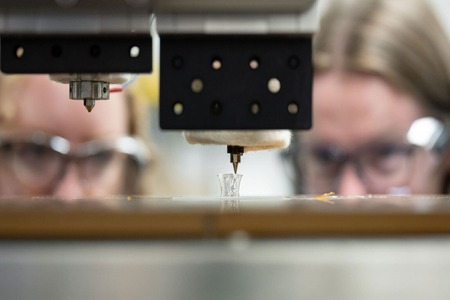

3D Printing
Princeton researchers have developed a cost-effective 3D printing method to create soft plastics with unique properties. This scalable technique allows for the production of materials that combine stretchiness, flexibility, and recyclability. The study, published in Advanced Functional Materials, details how the team utilized thermoplastic elastomers, a common class of polymers, to 3D-print structures with adjustable stiffness.
The process enables precise control over the material’s properties. By customizing the 3D printer’s print path, engineers can program the plastic to stretch and flex in one direction while remaining firm in another. This innovation opens up possibilities for various applications, including soft robotics, medical devices, prosthetics, lightweight helmets, and high-performance shoe soles.
Assistant professor Emily Davidson, who led the study, emphasized the importance of this innovation. “The elastomer forms nanostructures that we can control,” Davidson explained, noting that this gives designers significant control over the finished product. The team leveraged their understanding of block copolymer nanostructures and their response to flow to develop a printing technique that aligns these stiff nanostructures effectively.
The technique is both affordable and scalable for industrial use. Unlike traditional methods that rely on expensive materials like liquid crystal elastomers and complex multi-stage processing, this approach uses thermoplastic elastomers that cost about a cent per gram. These materials can be printed with commercially available 3D printers, making the technique accessible and practical for a wide range of industries.
Panda Biotech has partnered with TDMI Twin Dragon to unveil a groundbreaking hemp denim collection crafted from 100% American-grown industrial…
Serge Ferrari Group has unveiled Batyline (Stam) Skin Feel, a new addition to its acclaimed upholstery collection designed for both…
Soorty, a Pakistani denim manufacturer, has announced that its Soorty Organic Cotton Initiative is now officially recognised by the Organic…
Modern Meadow has partnered with Bellroy to introduce its Innovera biomaterial, formerly known as Bio-Vera, into a new range of…
Re&Up has entered into a strategic partnership with Italian yarn spinner Marchi & Fildi to co-develop a new generation of…
Unifi has unveiled Repreve with CiClo technology, combining recycled polyester and nylon with biodegradable technology to help tackle microfibre pollution.